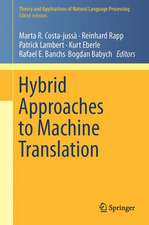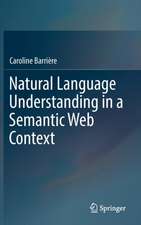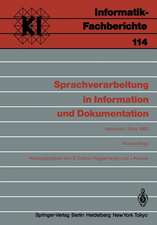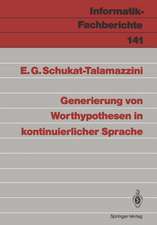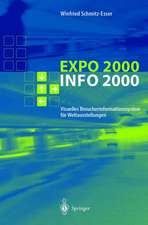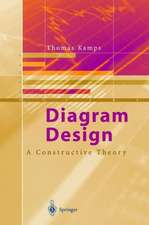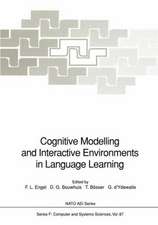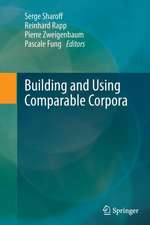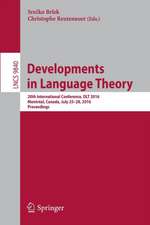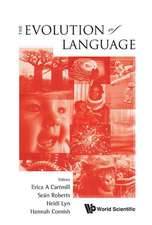Speech-to-Speech Translation: A Massively Parallel Memory-Based Approach: The Springer International Series in Engineering and Computer Science, cartea 260
Autor Hiroaki Kitanoen Limba Engleză Paperback – 9 oct 2012
The success of this project triggered several massively parallel projects, as well as other massively parallel artificial intelligence projects throughout the world.
Dr. Hiroaki Kitano received the distinguished `Computers and Thought Award' from the International Joint Conferences on Artificial Intelligence in 1993 for his work in this area, and that work is reported in this book.
| Toate formatele și edițiile | Preț | Express |
|---|---|---|
| Paperback (1) | 1039.94 lei 43-57 zile | |
| Springer Us – 9 oct 2012 | 1039.94 lei 43-57 zile | |
| Hardback (1) | 990.30 lei 43-57 zile | |
| Springer Us – 31 dec 1993 | 990.30 lei 43-57 zile |
Din seria The Springer International Series in Engineering and Computer Science
- 24%
 Preț: 1041.98 lei
Preț: 1041.98 lei - 20%
 Preț: 643.50 lei
Preț: 643.50 lei - 18%
 Preț: 1225.62 lei
Preț: 1225.62 lei - 18%
 Preț: 965.02 lei
Preț: 965.02 lei - 20%
 Preț: 646.12 lei
Preț: 646.12 lei - 18%
 Preț: 948.79 lei
Preț: 948.79 lei - 20%
 Preț: 646.62 lei
Preț: 646.62 lei - 15%
 Preț: 637.46 lei
Preț: 637.46 lei - 20%
 Preț: 643.83 lei
Preț: 643.83 lei - 18%
 Preț: 949.23 lei
Preț: 949.23 lei - 20%
 Preț: 644.48 lei
Preț: 644.48 lei - 20%
 Preț: 994.92 lei
Preț: 994.92 lei - 20%
 Preț: 645.97 lei
Preț: 645.97 lei - 18%
 Preț: 946.87 lei
Preț: 946.87 lei - 20%
 Preț: 995.57 lei
Preț: 995.57 lei - 18%
 Preț: 956.99 lei
Preț: 956.99 lei - 20%
 Preț: 644.98 lei
Preț: 644.98 lei - 15%
 Preț: 649.54 lei
Preț: 649.54 lei - 18%
 Preț: 950.21 lei
Preț: 950.21 lei - 18%
 Preț: 1221.38 lei
Preț: 1221.38 lei - 18%
 Preț: 957.62 lei
Preț: 957.62 lei - 15%
 Preț: 643.99 lei
Preț: 643.99 lei - 18%
 Preț: 948.47 lei
Preț: 948.47 lei - 18%
 Preț: 947.35 lei
Preț: 947.35 lei - 20%
 Preț: 1284.65 lei
Preț: 1284.65 lei - 20%
 Preț: 1628.31 lei
Preț: 1628.31 lei - 20%
 Preț: 1285.78 lei
Preț: 1285.78 lei
Preț: 1039.94 lei
Preț vechi: 1299.93 lei
-20% Nou
Puncte Express: 1560
Preț estimativ în valută:
199.06€ • 216.29$ • 167.31£
199.06€ • 216.29$ • 167.31£
Carte tipărită la comandă
Livrare economică 21 aprilie-05 mai
Preluare comenzi: 021 569.72.76
Specificații
ISBN-13: 9781461361787
ISBN-10: 1461361788
Pagini: 216
Ilustrații: XIX, 193 p.
Dimensiuni: 155 x 235 x 11 mm
Greutate: 0.31 kg
Ediția:Softcover reprint of the original 1st ed. 1994
Editura: Springer Us
Colecția Springer
Seria The Springer International Series in Engineering and Computer Science
Locul publicării:New York, NY, United States
ISBN-10: 1461361788
Pagini: 216
Ilustrații: XIX, 193 p.
Dimensiuni: 155 x 235 x 11 mm
Greutate: 0.31 kg
Ediția:Softcover reprint of the original 1st ed. 1994
Editura: Springer Us
Colecția Springer
Seria The Springer International Series in Engineering and Computer Science
Locul publicării:New York, NY, United States
Public țintă
ResearchCuprins
1 Introduction.- 1.1 Speech-to-Speech Dialogue Translation.- 1.2 Why Spoken Language Translation is So Difficult?.- 1.3 A Brief History of Speech Translation Related Fields.- 2 Current Research Toward Speech-to-Speech Translation.- 2.1 SpeechTrans.- 2.2 SL-TRANS.- 2.3 JANUS.- 2.4 MINDS.- 2.5 Knowledge-Based Machine Translation System.- 2.6 The HMM-LR Method.- 3 Design Philosophy Behind The ? DMDIALOG System.- 3.1 Introduction.- 3.2 Memory-Based Approach to Natural Language Processing.- 3.3 Massively Parallel Computing.- 3.4 Marker-Passing.- 4 The ? DMDIALOG System.- 4.1 Introduction.- 4.2 An Overview of the Model.- 4.3 Speech Input Processing.- 4.4 Memory-Based Parsing.- 4.5 Syntactic/Semantic Parsing.- 4.6 Discourse Processing.- 4.7 Prediction from the Language Model.- 4.8 Cost-based Ambiguity Resolution.- 4.9 Interlingua with Multiple Levels of Abstraction.- 4.10 Generation.- 4.11 Simultaneous Interpretation: Generation while Parsing is in Progress.- 4.12 Related Works.- 4.13 Discussions.- 4.14 Conclusion.- 5 DMSNAP: An Implementation On The Snap Semantic Network Array Processor.- 5.1 Introduction.- 5.2 SNAP Architecture.- 5.3 Philosophy Behind DMSNAP.- 5.4 Implementation of DMSNAP.- 5.5 Linguistic Processing in DMSNAP.- 5.6 Performance.- 5.7 Conclusion.- 6 Astral: An Implementation On The IXM2 Associative Memory Processor.- 6.1 Introduction.- 6.2 The Massively Parallel Associative Processor IXM2.- 6.3 Experimental Implementation I: A Flat Pattern Model.- 6.4 Performance.- 6.5 Memory and Processor Requirements.- 6.6 Enhancement: Hierarchical Memory Network.- 6.7 Experimental Implementation II: Hierarchical Memory Network Model.- 6.8 Performance.- 6.9 Hardware Architecture for Memory-Based Parsing.- 6.10 Conclusion.- 7 Memoir: An Alternative View.- 7.1 Introduction.-7.2 Overall Architecture.- 7.3 Knowledge Sources.- 7.4 Grammatical Inference.- 7.5 Examples Retrieval.- 7.6 Adaptive Translation.- 7.7 Monitor.- 7.8 Preliminary Evaluation.- 7.9 Conclusion.- 8 Conclusion.- 8.1 Summary of Contributions.- 8.2 Future Works.- 8.3 Final Remarks.



